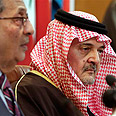
Saudi urges joint Arab strategy on Iran
'In order to cement Arab reconciliation we need common vision for issues that concern Arab security, deal with Iranian challenge,' says Saudi foreign minister speaking before Arab counterparts in Cairo; adds Iranian nuclear program affects security of all Gulf states
Saudi Foreign Minister Prince Saud al-Faisal called on Tuesday for a joint Arab strategy to deal with the "Iranian challenge" at a meeting of Arab foreign ministers in the Egyptian capital.
"In order to cement Arab reconciliation we need a common vision for issues that concern Arab security and deal with the Iranian challenge," including its nuclear drive, he said.
Al-Faisal detailed the "challenge" as Iran's nuclear program, that effects the security of all the Gulf states, and Iran's continued involvement in Iraqi, Lebanese and Palestinian affairs.
The Saudi prince urged Arabs to overcome their difference and said there has been a significant improvement in Arab ties recently, including Saudi-Syrian relations.
Al-Faisal also praised Egypt's efforts in reconciliation talks between the Palestinian factions, and expressed hope that these efforts would lead to an agreement that will restore Palestinian unity.
He called for the establishment of a Palestinian Unity government to represent all Palestinians and compel the world to recognize it and work with it.
This is not the first time an Arab nation speaks out against Iran. In January, the Egyptian foreign minister accused Iran of cooperating with Hamas and Hizbullah during Operation Cast Lead in Gaza in order to stir up a conflict in the Middle East.
"(They tried) to turn the region to confrontation in the interest of Iran, which is trying to use its cards to escape Western pressure ... on the nuclear file," Foreign Minister Ahmed Aboul Gheit said in a TV interview in January.
The relationship between Sunni-ruled Arab states in the Gulf, including oil kingpin Saudi Arabia, and Shia Iran has long been strained amid concern about Tehran’s nuclear program.
At the UN General Assembly last year, the Saudi prince urged Iran to comply with its nuclear obligations to spare the Middle East "devastating conflicts, futile arms races and serious environmental hazards."
The West fears Iran is secretly trying to build an atomic bomb but Teheran insists its nuclear drive is entirely peaceful and aimed at generating electricity for its growing population.
Foreign ministers of the 22-member Arab League are meeting at the group’s Cairo headquarters to discuss several issues including reconciliation moves by feuding Palestinian factions.
A decision expected on Wednesday by the International Criminal Court on whether to seek the arrest of Sudanese President Omar Al Beshir for alleged war crimes in Darfur is also expected to be discussed.
Ali Waked contributed to this report










